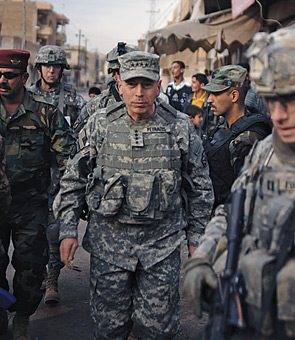
On the day after he assumed command of the Multi-National Forces in Iraq last February, David Petraeus toured some of the neighborhoods of Baghdad and was shocked. "They were ghost towns, blasted, abandoned. AQI [al-Qaeda in Iraq] was active in most of them," he told me recently. "I knew those areas — Dora, Ghazaliya, Amariya — from the last time I was in Baghdad, in 2005. I remembered thriving markets and community life. I simply hadn't grasped the magnitude of the destruction, not just the sectarian violence but the [intra-sect] violence of al-Qaeda on Sunnis."
There were other shocks. Petraeus had spent most of 2005 in Baghdad trying to train Iraqi Army units. In 2006, while he was serving as commander of the Combined Arms Center at Fort Leavenworth, Kans., much of the Iraqi security forces, and especially the national police, had slipped under the control of various Shi'ite and Kurdish militias. The situation on the ground was dire; the prognosis among Petraeus' military peers was pessimistic. At a Pentagon meeting with the Joint Chiefs of Staff in December 2006, President Bush asked the Chiefs how many supported the idea of a surge — the deployment of more troops (which Petraeus would command) into Baghdad to secure the city and create the conditions necessary for a reconciliation of the various Iraqi political factions. The Chiefs were unanimously opposed.
Many of Petraeus' Pentagon peers — who were always suspicious of their colorful rival, with his penchant for push-up contests and a doctorate from Princeton in international relations — are still opposed to what he is doing in Iraq. They believe too many U.S. troops and too much equipment are engaged in a struggle likely to have a futile outcome. The Iraqi political leaders remain recalcitrant, their government a dysfunctional mess. The true loyalties of the Iraqi security forces remain questionable. Much of the American public has tired of the war, although tolerance for the effort seems to be creeping upward in some polls as the level of violence in Iraq abates.
And yet Petraeus has not failed, which, given the anarchy and pessimism of February, must be considered something of a triumph. The sketchy progress he has made is the result of equal parts luck and skill. The Sunni tribal revolt against the violent grip of Salafist extremists (most notably, al-Qaeda in Iraq) was already under way when Petraeus arrived. But he was smart enough to encourage and fund the Anbar Awakening, even though Iraq's Shi'ite-dominated central government was opposed. The pacification of Anbar, the most violent province in 2006, has been the signal success of 2007.
But the most significant change that Petraeus brought to Iraq has to do with how troops are deployed. Previously, most U.S. troops had been sequestered in five huge military bases. They would patrol the collapsing cities, usually in motorcades, and then return to their fortresses. But Petraeus established a network of joint security stations in the neighborhoods of Baghdad and its environs where U.S. troops and Iraqi forces live and work together. That created a constant military presence in the streets. This heavily armed version of community policing was a central tenet of the counterinsurgency doctrine that Petraeus helped develop during his time at Fort Leavenworth. It is not entirely responsible for the diminution of violence in Baghdad — ethnic cleansing has limited the inter-sect strife — but it certainly has helped bring life, and a sense of security, back to some of the neighborhoods Petraeus toured in February.
"People keep asking me if we've reached a turning point," Petraeus says, "and I can't say that we have. We'll probably realize we passed a turning point six months after we reach it." In fact, the general has been very cautious in his assessments of the war, saying repeatedly, to the dismay of many hawks, that "military victory is not possible." Petraeus also disputes me when I suggest that he's an optimist: "Please don't write that. I'm a realist."
But many of his troops, especially his protégés in the command structure, disagree. Military officers are trained to complete a mission, no matter how difficult it might seem, and Petraeus appears quite incapable of imagining that he might not succeed, which is optimism of a sort. "Blindingly optimistic, even for our culture," a senior military officer in Baghdad told me. The general can be overly impressed by credentials, military and academic. "But he's scary smart," the officer continues. "He networks down as well as up, and he absolutely supports his people."
Most Americans know Petraeus best from his performance at congressional hearings in Washington last September, a moment of some discomfort for him. One suspects, though, that the general takes greater satisfaction from the innocent humanity he sees spilling back into the Baghdad streets on his regular helicopter tours of the city at dusk — and from the knowledge that he may be remembered as the man who taught the U.S. military how to transform anarchic war zones into communities again.